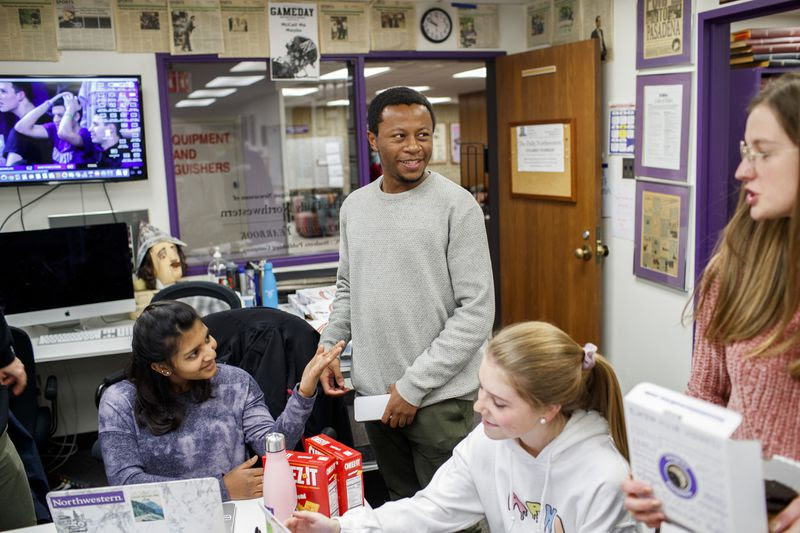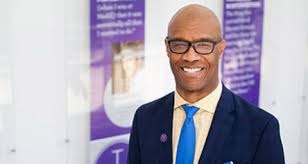
Troy Closson, a 21-year-old senior at Northwestern, stands in the Daily Northwestern newsroom. (Credit: Armando Sanchez/Chicago Tribune)
Syracuse U. Paper Rips ‘Years of Inaction’
3-Year Project Bares L.I. Housing Bias
Public Radio’s Joshua Johnson to Join MSNBC
High Court Might Send Back Byron Allen Case
Fox, CNN Barely Cover Trump Aide’s Racist Emails
TV One Cancels DL Hughley After 7 Months
Laid-Off Journalists Urge Limits on Big Tech
Students of Color Not as Bullish on Free Speech
ACLU Sues DHS on Behalf of 5 Border Journalists
2 Say Comcast Didn’t Fully Back Black Networks
Nunes Joins ‘Universe of Untruth’ in Media Attack
At: https://www.journal-isms.com/2019/11/syracuse-u-paper-rips-years-of-inaction
Empathy for ‘Marginalized’ Backfires
A dust-up about Northwestern University’s student newspaper over the past week has its roots in its editors’ desire to do right by “marginalized” people who have long complained that the white media don’t do right by them.
But the real problem, according to Charles Whitaker, the first African American dean of Northwestern’s Medill School of Journalism, Media, Integrated Marketing Communications, is that “the public is quite unaware of what journalism is, what our processes are, what it means to be balanced.
“The public thinks of journalism as advocacy and many of our students when they start thinking of journalism as advocacy as well,” Whitaker told CNN’s “Reliable Sources” on Sunday. “And we quickly try to disabuse them of that notion. But the public thinks that, you know, I think in this era where so much of our media is balkanized and partisan and very much perspective driven, the public thinks that that’s as it should be, and you’re either with us or against us. . . .”
An incident like the current dustup, Whitaker maintained, “actually underscores the need for us to embark on a campaign of media literacy.”
 As “Reliable Sources” host Brian Stelter explained, “Whitaker’s comments were prompted by the waves of outrage directed at the university’s independently run publication.
As “Reliable Sources” host Brian Stelter explained, “Whitaker’s comments were prompted by the waves of outrage directed at the university’s independently run publication.
“The first wave came after The Daily Northwestern covered former US Attorney General Jeff Sessions’ visit to campus — and the protests that ensued.
“Some activists said the student newspaper harmed them by publishing photos of the protest and by using the school directory to contact protesters for interviews.
“As the Daily Northwestern said in one of its own stories, ‘the incident laid bare the strained relationship between journalists and activists on campus, reflecting long-voiced concerns that reporters, in pursuit of the traditional sense of objectivity, fail to practice compassion and empathize with the circumstances of those they write about.’
“The student editors were overwhelmed by what Whitaker called ‘hate mail’ after covering the protest. He said some of the messages were ‘threatening.’
“That’s the context for what came next: The removal of some photos and a statement of apology from the newspaper.
“While the statement may have appeased some of the students at Northwestern, it horrified professional journalists who learned about it via social media. There was a full-fledged Twitter uproar about the paper’s decision to apologize for, in essence, committing basic acts of journalism. . . .”
Kathleen Foody of the Associated Press provided more context: “[Troy] Closson, a 21-year-old senior at Northwestern, is only the third black student to lead the paper since its founding in 1881,” Foody wrote Nov. 12. “Closson said he was the only black staff member when he joined the paper as a freshman, and he found the paper lacked stories on students ‘who looked like me or had experiences like me.’
“He and other editors leading the paper in recent years were determined to change that, including the creation of a team focused on building diversity in the paper’s coverage, Closson said.
“According to the National Center for Education Statistics, Northwestern’s enrolled undergraduates in the fall of 2018 were 45% white, 17% Asian, 12% Hispanic and 6% black. This year’s freshman class is 54% white, 12.6% Hispanic/Latino and 10.2% black, according to Northwestern’s admissions office. . . .”
In the Chicago Tribune, columnist Dahleen Glanton went straight to the racial dynamics.
“The bottom line is that Closson was forced to answer the question nearly every black journalist has been asked at one time or another in their career: “Are you black first or are you a journalist first?‘ ” Glanton wrote on Nov. 12.
“The question doesn’t always come from the outside. Sometimes it comes from within. Regardless, there is only one correct answer.
“We are journalists. That doesn’t mean, however, that we should lose sight of who we are as individuals. Experience gives every journalist, regardless of race, the tools we need to better navigate the delicate journey between our work and our individuality.
“As African Americans, we perform our jobs as vigorously as our white counterparts, without losing sight of the subtle and sometimes intangible cultural undercurrents that often lie beneath the surface of complicated news stories. These are assets that our race affords us.
“Closson was a black student in a powerful position, directing the coverage of one of the biggest news events to take place on campus. And to do the job well, he had to put other students of color in jeopardy of being reprimanded by the university. His initial instinct was correct.
“Among the racially diverse group of protesters were African American and Latino students — minority groups that have been most directly penalized by the policies Sessions carried out while in Donald Trump’s administration, regarding civil rights, immigration, police reform, voting rights and LGBTQ rights. . . .”
Glanton also wrote, “The protesters have to understand that there often are consequences for standing up in what you believe in. In the 1960s, students were kicked out of school and adults lost their jobs marching for the right to vote or to sit down on a public bus. If you ask many of them today as elders, they would say they’d proudly do it again.
“The job of a journalist isn’t supposed to be easy. But we can never lose sight of our mission — to serve as watchdogs in the interest of the public. That must never change, regardless of the color of our skin.”
- Barbara Allen, poynter.org: Give the Northwestern journalists a break — this is how college media works
- Jarvis DeBerry, cleveland.com:: Students are sadly twisting journalistic standards into controversies
- Sharif Durhams, CNN: Student journalists apologized, and that was a mistake
- Adam
Duvernay,Register-Guard, Eugene, Ore.: After criticism at top journalism school, UO student reporters stick to principles - Editorial, Brown and White, Lehigh University: The trials of student journalism
- Kathleen Foody, Associated Press: Northwestern paper’s apology sparks journalism debate
- Dahleen Glanton, Chicago Tribune: The apologetic editorial in Northwestern’s student newspaper reveals an issue most black journalists face
- John Kass, Chicago Tribune: Northwestern University, the cancel culture and ‘Whatsoever things are true’
- Zach Kessel, Washington Post: I write for the Daily Northwestern. We shouldn’t apologize for doing our jobs.
- Katie Pellico and Brian Stelter, CNN: Journalism school dean’s message to activists: ‘We must allow journalists to do their jobs’ (podcast)
- Student Press Law Center: What we can all learn from the situation at Northwestern
- Margaret Sullivan, Washington Post: Northwestern’s student journalists shouldn’t apologize for reporting. But don’t pillory them.
- Erik Wemple, Washington Post: Yes, the Daily Northwestern screwed up. But who are we to judge?
- Charles Whitaker, Medill School: Whitaker shares statement on The Daily Northwestern’s coverage of campus events
- Charles Whitaker, USA Today Northwestern’s Jeff Sessions protest controversy: ‘Give the young people a break’
- Kevin D. Williamson, New York Post: Northwestern’s bungling student journalists were just copying the professionals
Facebook users: “Like” “Richard Prince’s Journal-isms” on Facebook.
Follow Richard Prince on Twitter @princeeditorRichard Prince’s Journal-isms originates from Washington. It began in print before most of us knew what the internet was, and it would like to be referred to as a “column.” Any views expressed in the column are those of the person or organization quoted and not those of any other entity. Send tips, comments and concerns to Richard Prince at journal-isms-owner@yahoogroups.com
View previous columns (after Feb. 13, 2016).
- Diversity’s Greatest Hits, 2018 (Jan. 4, 2019)
- Book Notes: Is Taking a Knee Really All That? (Dec. 20, 2018)
- Book Notes: Challenging ’45’ and Proudly Telling the Story (Dec. 18, 2018)
- Book Notes: Get Down With the Legends! (Dec. 11, 2018)
- Journalist Richard Prince w/Joe Madison (Sirius XM, April 18, 2018) (podcast)
- Richard Prince (journalist) (Wikipedia entry)
- February 2018 Podcast: Richard “Dick” Prince on the need for newsroom diversity (Gabriel Greschler, Student Press Law Center, Feb. 26, 2018)
- Diversity’s Greatest Hits, 2017 — Where Will They Take Us in the Year Ahead?
- Book Notes: Best Sellers, Uncovered Treasures, Overlooked History (Dec. 19, 2017)
- An advocate for diversity in the media is still pressing for representation, (Courtland Milloy, Washington Post, Nov. 28, 2017)
- Morgan Global Journalism Review: Journal-isms Journeys On (Aug. 31, 2017)
- Diversity’s Greatest Hits, 2016
- Book Notes: 16 Writers Dish About ‘Chelle,’ the First Lady
- Book Notes: From Coretta to Barack, and in Search of the Godfather
- Journal-isms’ Richard Prince Wants Your Ideas (FishbowlDC, Feb. 26, 2016)
- “JOURNAL-ISMS” IS LATEST TO BEAR BRUNT OF INDUSTRY’S ECONOMIC WOES (Feb. 19, 2016)
- Richard Prince with Charlayne Hunter-Gault,“PBS NewsHour,” “What stagnant diversity means for America’s newsrooms” (Dec. 15, 2015)
- Book Notes: Journalists Follow Their Passions
- Book Notes: Journalists Who Rocked Their World
- Book Notes: Hands Up! Read This!
- Book Notes: New Cosby Bio Looks Like a Best-Seller
- Journo-diversity advocate turns attention to Ezra Klein project (Erik Wemple, Washington Post, March 5, 2014)
Columns below from the Maynard Institute are not currently available but are scheduled to be restored soon on journal-isms.com.
- Book Notes: “Love, Peace and Soul!” And More
- Book Notes: Book Notes: Soothing the Senses, Shocking the Conscience
- Diversity’s Greatest Hits, 2015
- Diversity’s Greatest Hits, 2014
- Diversity’s Greatest Hits, 2013
- Diversity’s Greatest Hits, 2012
- Diversity’s Greatest Hits, 2011
- Diversity’s Greatest Hits, 2010
- Diversity’s Greatest Hits, 2009
- Diversity’s Greatest Hits, 2008
- Book Notes: Books to Ring In the New Year
- Book Notes: In-Your-Face Holiday Reads
- Fishbowl Interview With the Fresh Prince of D.C. (Oct. 26, 2012)
- NABJ to Honor Columnist Richard Prince With Ida B. Wells Award (Oct. 11, 2012)
- So What Do You Do, Richard Prince, Columnist for the Maynard Institute? (Richard Horgan, FishbowlLA, Aug. 22, 2012)
- Book Notes: Who Am I? What’s Race Got to Do With It?: Journalists Explore Identity
- Book Notes: Catching Up With Books for the Fall
- Richard Prince Helps Journalists Set High Bar (Jackie Jones, BlackAmericaWeb.com, 2011)
- Book Notes: 10 Ways to Turn Pages This Summer
- Book Notes: 7 for Serious Spring Reading
- Book Notes: 7 Candidates for the Journalist’s Library
- Book Notes: 9 That Add Heft to the Bookshelf
- Five Minutes With Richard Prince (Newspaper Association of America, 2005)
- ‘Journal-isms’ That Engage and Inform Diverse Audiences (Q&A with Mallary Jean Tenore, Poynter Institute, 2008)Chrissie Gale, Jennifer Davidson and Nigel Cantwell, the Conversation: Child migrants around the world are being denied their human rights
